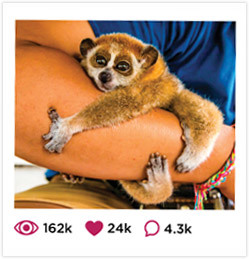
Be Informed, Buy Informed.
As a partner with the Wildlife Trafficking Alliance, Zoo New England collaborates with a powerful coalition of nonprofit organizations, companies and AZA-accredited aquariums and zoos working together to combat the illegal trade of wildlife.
You can be part of the solution.
From climate change to habitat loss, animals around the world are suffering steep population declines. But in the last decade, illegal poaching has been pushing endangered animals to the brink of extinction. High global demand for exotic pets fuels the illegal capture and trade of millions of animals, many of which suffer and die in the process. We as consumers can make informed purchasing choices that can change the course of wildlife trafficking. Put simply: if we don't buy it, they'll stop selling it. Here are some ways you can help:
Think twice before purchasing an exotic pet
Millions of wild animals are taken illegally from their wild homes, so they can be sold as pets around the world. Owning an exotic pet is harmful to both animals and people—particularly from a wildlife trafficking and zoonotic disease perspective. Other reasons to avoid exotic pet ownership include the high cost of care and special food, veterinary, and habitat needs. Visit AZA's "Not a Pet" website to learn more about the illegal trade of live wildlife as pets.
Share with care on social media
 Browsers Beware: Don't believe everything you see online. This wild animal may look cute and appear content in human hands on this social media post, but it is actually in distress—and was potentially illegally taken from its wild home and family. As consumers of social media, be careful about how you engage so you don't unintentionally promote illegal or harmful activities.
Browsers Beware: Don't believe everything you see online. This wild animal may look cute and appear content in human hands on this social media post, but it is actually in distress—and was potentially illegally taken from its wild home and family. As consumers of social media, be careful about how you engage so you don't unintentionally promote illegal or harmful activities.
- Limit what you "like:" any reaction can popularize and increase demand for exotic pets or wild animal interaction.
- Think before you click: clicks on exotic pet posts can reinforce visibility and shares.
- Beware of what you share so you don't accidentally bring positive attention to illegal ownership of wild animals.
- Don't follow or subscribe to accounts that might be promoting exotic pet ownership.
- Avoid playing any videos with questionable content, as producers may profit from this.
Never buy these products
Around the world, you’ll find wildlife and plant products for sale—as jewelry, clothes, pets, souvenirs and more. But just because something is for sale doesn’t mean it’s legal to take home. Some of these products may be made from protected animals or plants and could be illegal to export or import. Other wildlife products may require permits before you can bring them home to the United States.
By making informed choices, you can avoid having your souvenir confiscated or paying a fine, and more importantly, support wildlife conservation around the world. Here's how you can make a difference:
Top 5 Products to Never Buy
- Ivory: raw or carved: Avoid raw or carved ivory from the teeth or tusks of elephants, whales, walruses, and narwhals. Don't purchase ivory carved into jewelry, carvings, figurines, chopsticks, or hair clips.
- Tiger Products: Avoid products from tigers used in traditional medicine, sold as furs, or as souvenirs or “good luck” charms.
- Rhino Products: Avoid products from rhinos used in traditional medicine, jewelry, or souvenirs.
- All Sea Turtle Products: Avoid jewelry, hair combs and sunglass frames made from sea turtle shell. Don't buy sea turtle meat, soup, eggs, facial creams, shells, leathers, boots, handbags, and other goods made from sea turtle skin.
- Medicinals: Avoid traditional medicines made from rhino, tiger, leopard, Asiatic black bear, or musk deer.
Top 5 Products to Avoid or Question
- Reptile Leather Products: Many garments including belts, handbags, watchbands, and shoes are made from non-endangered species and are ok to purchase. However, certain leather products may contain caiman, crocodiles, lizards and snakes. Check that your product has a CITES permit before purchasing.
- Coral and Shells: Many countries limit the collection, sale, and export of live coral and coral products. If you want to purchase coral as a souvenir, jewelry, or aquarium decoration, find out if you need a CITES permit to bring it back to the U.S. Permits may also be required to bring back queen conch shells from many Caribbean countries.
- Wild Bird Feathers: Most wild bird feathers require permits, including from parrots, macaws, cockatoos and finches.
- Furs: Beware when purchasing furs while traveling abroad. Most of the world’s wild cats are protected and you can't import skins or items made using the fur of these protected animals.
- Wools: Shahtoosh shawls are woven with the down hair of the protected Tibetan antelope. However, travelers may import clothing made from vicuna (a South American mammal) with a permit from the country of purchase.
Ask Before You Buy
- What is this product made of?
- Where did this product come from?
And if traveling outside of the U.S.:
- Does the country I’m visiting allow the sale and export of this product?
- Do I need permits or other documents from this country or the United States to bring this item home?
Information sourced from the Wildlife Trafficking Alliance
Contact your elected officials
Cast your vote for conservation. Be a voice for the voiceless. Your elected officials are listening. Visit AZA's Legislative Education Center to take action.
Video
Tips from our ZooTeens!
So you want a pet turtle. Do you know where it’s coming from? Our ZooTeen team recently helped raise awareness about the dangers of illegal wildlife trafficking. Hear from Joel, Marcia, McKayla, Sean B. and Ruby about what happens when turtles are taken from the wild.
Zoo to You
In our #ZootoYou video, learn how we're combatting illegal wildlife trafficking here at Zoo New England, and what you can do to help.
"Be Informed. Buy Informed." PSA by USWTA.org
In the News:
Zoo New England helps provide housing and critical care for illegally trafficked turtles Full Story
Reduce the Risk
Learn about our commitment to reducing zoonotic disease threats by combating wildlife trade.


